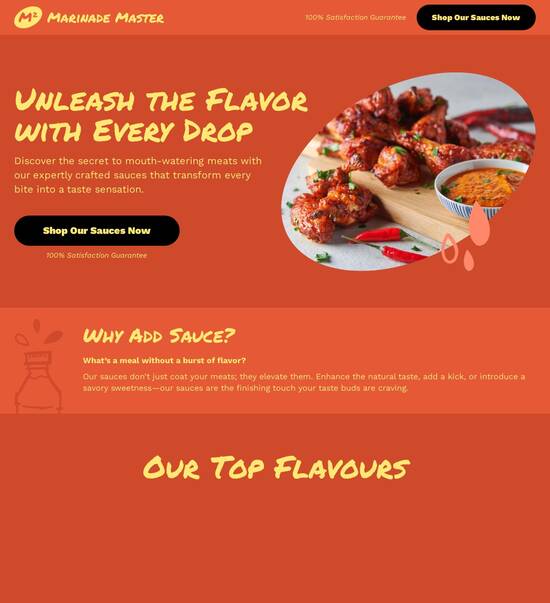
Ruby interactive website template
Explore Similar TemplatesAbout template
Engage more visitors with our ruby interactive website template, designed for both beauty and conversion, and perfect for any industry.
Recommended templates

Easy to build without coding
With the intuitive drag-and-drop builder, anyone on your team can create high-converting pages without any knowledge of code or design. Make enhancements to your landing page with custom widgets using Javascript, HTML/CSS, or third-party scripts.

Multiple layouts for any industry and goal
Select from 500+ landing page layouts built to boost conversions across industry-specific scenarios. Customize them by adjusting fonts, adding images, and generating on-brand content with the AI assistant. Quickly scale with Instablocks® and Global Blocks that you can save, reuse, and update globally.

Loads fast and looks polished on any device
Every template is responsive, which means they present professionally on any device and load blazingly fast with our Thor Render Engine. You can also power them up with Google AMP technology to deliver an unparalleled mobile experience and drive higher conversions.

Robust analytics & experimentation
Get real-time updates and reporting across all your devices, showing the number of visitors, conversions, cost-per-visitor, and cost-per-lead. Launch AI-powered experiments, run A/B tests, and use heatmaps to analyze user behavior, then optimize your landing page to maximize conversions.







Easy to build without coding
With the intuitive drag-and-drop builder, anyone on your team can create high-converting pages without any knowledge of code or design. Make enhancements to your landing page with custom widgets using Javascript, HTML/CSS, or third-party scripts.
Multiple layouts for any industry and goal
Select from 500+ landing page layouts built to boost conversions across industry-specific scenarios. Customize them by adjusting fonts, adding images, and generating on-brand content with the AI assistant. Quickly scale with Instablocks® and Global Blocks that you can save, reuse, and update globally.
Loads fast and looks polished on any device
Every template is responsive, which means they present professionally on any device and load blazingly fast with our Thor Render Engine.
Robust analytics & experimentation
Get real-time updates and reporting across all your devices, showing the number of visitors, conversions, cost-per-visitor, and cost-per-lead. Launch AI-powered experiments, run A/B tests, and use heatmaps to analyze user behavior, then optimize your landing page to maximize conversions.
All the features you need to build ruby on rails template website
Explore more featuresLearn how to build ruby interactive
Frequently asked questions about ruby template engine
Leading the way in building high-performing landing pages





A comprehensive guide to using Instapage for landing page creation
Instapage is your go-to solution for creating high-performing landing pages that maximize ROI for your marketing campaigns. With its robust features designed for various industries, such as Business Services, Marketing and Advertising, Tech/SaaS, and more, Instapage enables you to accelerate and optimize your digital marketing efforts effectively.
Understanding Instapage's value proposition
Instapage stands out as the most powerful landing page and CRO platform by providing marketers with all necessary tools to transform and boost campaigns. Whether you're a small team or an enterprise, Instapage caters to all budgets, ensuring easy access to top-notch marketing resources.
- Access to 100+ high-converting templates which facilitate quick page launches.
- Flexible, no-code landing page builder that eliminates the need for developers.
- Built-in experimentation features to optimize conversions and track performance.
Step 1: Choose the right template for your campaign
Selecting an appropriate template is crucial to resonate with your target audience. With Instapage’s library, you can choose from various designs that meet your campaign goals while saving time.
- Identify your campaign objective (e.g., lead generation, product launch). Choose a template that aligns with this objective.
- Utilize Conversion-Focused Layouts to draw attention to essential elements on the page.
- Experiment with different designs using A/B testing to discover what works best.
Step 2: Customize your landing page
Once you have chosen a template, it's time to tailor it for your audience. Customize typography, colors, and images to reflect your brand identity.
- Incorporate dynamic text replacement to align page content with user queries.
- Utilize Instablocks for reusable design elements to maintain consistency across pages.
- Incorporate lead generation elements like forms or buttons to capture user info.
Step 3: Optimize your page for conversion
Optimization is key to achieving higher conversion rates. Leveraging Instapage’s analytics dashboard can guide you in making data-driven decisions.
- Analyze heatmaps to see where users engage the most.
- Implement A/B tests on CTAs to determine which prompts yield higher conversion.
- Use audience-level tracking to evaluate effectiveness across different segments.
By following these steps, you will create an effective landing page that drives results and maximizes ROI.
If you're ready to elevate your marketing strategy with standout landing pages, start using Instapage today and see substantial growth in your digital campaigns!
Ruby Interactive Website Templates: A Guide to Engaging Web Development
Understanding the essence of Ruby interactive website templates
Ruby interactive website templates are designed to enhance the user experience by incorporating dynamic features that respond to user interactions. These templates leverage Ruby's unique syntactic advantages, allowing developers to create rich, engaging web applications with ease. Unlike traditional templates that deliver static content, interactive templates offer an immersive environment where users can engage with various elements in real time.
The importance of Ruby interactive website templates in modern web development cannot be overstated. As users' expectations evolve, businesses must adapt by providing more engaging experiences. Interactivity bridges the gap between static and dynamic content, fostering deeper user engagement and encouraging return visits.
Core features of Ruby interactive website templates
One of the most notable features of Ruby interactive website templates is their rich interactivity capabilities. By employing event-driven programming principles, developers can enable dynamic responses that enhance user interaction. For instance, users may trigger animations or transitions by clicking buttons or scrolling through pages, providing an enjoyable browsing experience.
Additionally, these templates often come with simplified content management options. Many templates include built-in frameworks that streamline the process of updating content, while user-friendly dashboards empower non-technical teams to manage website elements effortlessly. This ease of use is crucial for businesses looking to maintain an engaging online presence without heavily relying on developer resources.
Event-driven programming enables immediate user feedback.
Smooth animations help to engage users and keep them interested.
User-friendly dashboards facilitate easy content updates by non-technical staff.
Responsive design principles ensure accessibility across various devices.
Benefits of using Ruby interactive website templates
The enhanced user experience offered by Ruby interactive website templates is undeniable. By integrating dynamic elements, these templates increase user interaction rates significantly, which can lead to improved retention and higher conversion metrics. When users are engaged, they are more likely to explore the site further and make meaningful interactions, whether it's filling out forms, purchasing products, or subscribing to newsletters.
Another advantage of using Ruby interactive templates is the speed and efficiency of development. With predefined components available, developers can rapidly prototype and iterate, which streamlines the overall development cycle. Moreover, debugging processes are simplified thanks to Ruby's clear syntax and available tools.
Interactive features boost user engagement and satisfaction.
Fast development cycles reduce time to market for new features.
Flexibility in design allows businesses to adapt to varying needs.
The technology stack behind Ruby interactive templates
At the heart of many Ruby interactive website templates is Ruby on Rails, which serves as a robust foundation for web applications. This framework helps developers create scalable, maintainable applications that align with modern best practices. Additionally, the supportive Ruby community provides endless resources and tools, ensuring that teams can find answers to their queries and optimize their development process.
Integrating frontend technologies like JavaScript frameworks, such as React or Vue.js, with Ruby allows for powerful user interface enhancements. Coupled with CSS preprocessors, these tools facilitate the creation of visually appealing and functionally rich templates that meet various design requirements.
Ruby on Rails provides a strong foundation for web development.
Integration with JavaScript frameworks enhances the user experience.
CSS preprocessors aid in creating maintainable and responsive designs.
How teams can leverage Ruby interactive templates
To maximize the benefits of Ruby interactive website templates, teams must adopt a collaborative development process. Using version control systems like Git allows team members to track changes, resolve conflicts, and push updates seamlessly. This transparency in the development process fosters better communication and collaboration, ensuring that everyone is on the same page.
Empowering non-technical teams is equally crucial for utilizing these templates effectively. By introducing training sessions and building a support network within the organization, businesses can enhance their teams' proficiency with the Ruby framework and template functionalities. This investment will pay off in the long run as it allows for quicker content updates and a more agile response to market changes.
Version control tools facilitate collaborative project management.
Training programs increase overall team proficiency.
A robust support network fosters knowledge sharing.
Engaging communities surrounding Ruby interactive templates
Engaging with communities surrounding Ruby is vital for staying updated and gaining support. Platforms like Stack Overflow and specific Ruby forums provide invaluable resources for developers seeking answers to complex questions. Additionally, participating in Ruby meetups and conferences enables professionals to network, share experiences, and learn from others in the field.
Contributing to open-source projects can also significantly benefit developers. By sharing code and collaborating with others, contributors can showcase their skills while giving back to the community. This collaboration nurtures collective knowledge, leading to advancements in Ruby templates and frameworks.
Forums and online communities offer support for developers.
Meetups provide networking opportunities to share knowledge.
Contributing to open-source projects enhances personal and community growth.
Crafting content for an interactive experience
Creating engaging content for Ruby interactive templates involves storytelling through design. Aligning content with interactive elements ensures that users can seamlessly navigate through the web experience. A strong narrative flow connects users with the message, making it more effective and memorable.
Moreover, SEO considerations cannot be overlooked. As dynamic content becomes a staple of modern websites, ensuring that it is optimized for search engines is crucial. This includes using descriptive titles, proper tagging, and features that enhance accessibility for all users.
Storytelling through design enhances user engagement.
SEO optimization is vital for ensuring content visibility.
Accessibility features contribute to reaching a wider audience.
Addressing frequently asked questions (FAQ)
When considering implementation of Ruby interactive website templates, a common question arises: How to select the right Ruby framework for your project? The choice largely depends on project requirements, team expertise, and available resources. Analyzing these factors will guide teams toward making effective decisions that align with their goals and expectations.
Another concern involves performance. Developers may worry about ensuring fast load times when employing interactive elements. Strategies such as optimizing images, employing caching techniques, and managing resource utilization can alleviate these concerns and maintain a smooth user experience.
Evaluate project needs to choose the right Ruby framework.
Use optimization techniques like caching for improved performance.
Monitor resource utilization to ensure efficiency.
Future prospects of Ruby interactive templates
Looking ahead, the future of Ruby interactive website templates appears bright, with emerging trends in web development technologies paving the way for more innovative solutions. Predictions suggest interactivity will continue to evolve, with a strong emphasis on enhanced user personalization and tailored experiences that cater to individual preferences.
Integrating artificial intelligence and machine learning into interactive templates can significantly enhance user engagement. These technologies have the potential to learn and adapt content based on user behavior, thereby creating a more relevant browsing experience.
Interactivity will adapt to evolving user demands.
AI and machine learning will drive personalized user experiences.
Engaging with new technologies will keep developers innovative.
Ready to skyrocket conversions?
Supercharge your ad campaigns with high-performing landing pages
Get started














